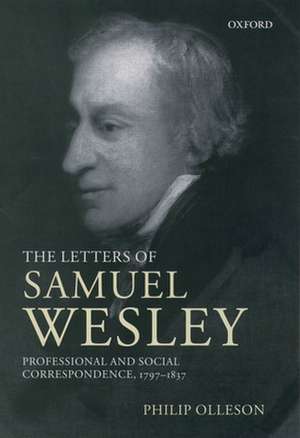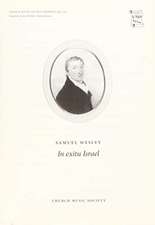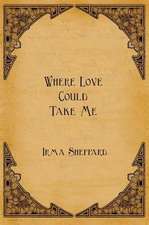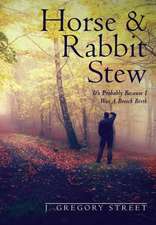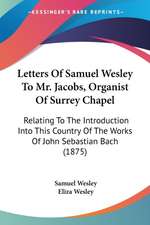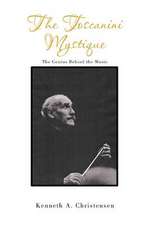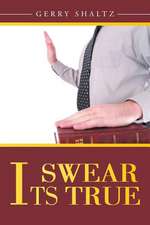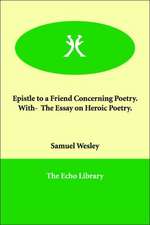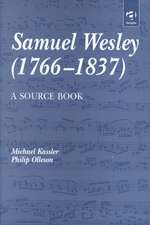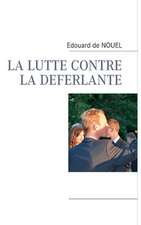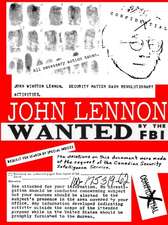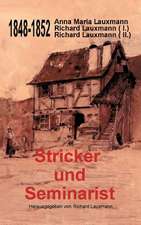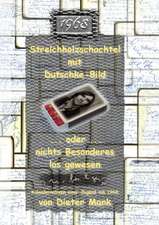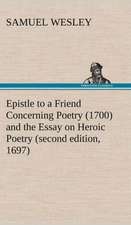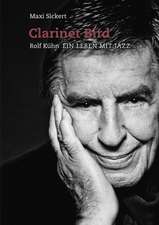The Letters of Samuel Wesley: Professional and Social Correspondence 1797-1837
Autor Samuel Wesley Editat de Philip Ollesonen Limba Engleză Hardback – 5 apr 2001
Preț: 2070.57 lei
Preț vechi: 3149.35 lei
-34% Nou
Puncte Express: 3106
Preț estimativ în valută:
396.33€ • 430.65$ • 333.13£
396.33€ • 430.65$ • 333.13£
Carte tipărită la comandă
Livrare economică 10-16 aprilie
Preluare comenzi: 021 569.72.76
Specificații
ISBN-13: 9780198164234
ISBN-10: 0198164238
Pagini: 580
Ilustrații: 3 plates, 20 music examples
Dimensiuni: 163 x 242 x 34 mm
Greutate: 1.12 kg
Editura: OUP OXFORD
Colecția OUP Oxford
Locul publicării:Oxford, United Kingdom
ISBN-10: 0198164238
Pagini: 580
Ilustrații: 3 plates, 20 music examples
Dimensiuni: 163 x 242 x 34 mm
Greutate: 1.12 kg
Editura: OUP OXFORD
Colecția OUP Oxford
Locul publicării:Oxford, United Kingdom
Recenzii
... excellent Biographical Introduction ... Philip Olleson has done a tremendous service to the historians of both music and Methodism by not only making the correspondence accessible but providing such extensive and scholarly footnotes ... a valuable addition to the available literature on the Wesley family at a time when Samuel's music is becoming more widely available.
An outstanding scholarly resource that will interest greatly scholars from music to history to religion.
A fascinating professional and social life-history.
A distinctive contribution to Wesley scholarship.
For those studying Samuel Wesley's life or music, the collection will rightly be seen as indispensable.
Philip Olleson's volume Professional and social correspondence 1797-1837 is beautifully produced and an indispensable companion to the Source book. Within its pages Wesley's voice speaks clearly and continuously.
Scholars owe Philip Olleson an enormous debt of gratitude, because he has opened the door on an extremely significant, yet little known, area of research, and has given Samuel Wesley the recognition he truly deserves.
The Letters reveals an enormous breadth of erudition and editorial control. At no point does one feel overwhelmed by unnecessary minutiae, or deficient in information ... each page shows great mastery of his topic and fine methodological balance.
Here is a book which brings Wesley's importance into focus, and provides the first thoroughly researched work of its kind. Olleson's meticulous edition will reposition Wesley in music studies of the period and will substantially revise our understanding of musical culture of the time.
A welcome and long overdue initiative.
This is a treasury of information which will remain a classic edition for many years to come. Philip Olleson is to be congratulated on his research and production. His promised supplementary volumes will be awaited with great anticipation.
The publication marks a turning point in our understanding of this extraordinary member of the Wesley family. It brings together for the first time some 400 letters to friends and fellow musicians, meticulously researched, superbly annotated and indexed and prefaced by a chronology of Samuels's life and a brief biography.
Wesley, whose own publishing ventures came to little, and whose contributions to musical learning were never given their due value ... would have been amazed and delighted to see this beautifully produced book, doubtless pausing only a moment before dashing off a long and genial letter of approbation to its precise and literate editor, Philip Olleson.
We must be grateful to Philip Olleson for his painstaking scholarship, his immense sympathy for his subject and his ability to give non-musical minds the possibility of appreciating the musical history of England in the early nineteenth century.
An outstanding scholarly resource that will interest greatly scholars from music to history to religion.
A fascinating professional and social life-history.
A distinctive contribution to Wesley scholarship.
For those studying Samuel Wesley's life or music, the collection will rightly be seen as indispensable.
Philip Olleson's volume Professional and social correspondence 1797-1837 is beautifully produced and an indispensable companion to the Source book. Within its pages Wesley's voice speaks clearly and continuously.
Scholars owe Philip Olleson an enormous debt of gratitude, because he has opened the door on an extremely significant, yet little known, area of research, and has given Samuel Wesley the recognition he truly deserves.
The Letters reveals an enormous breadth of erudition and editorial control. At no point does one feel overwhelmed by unnecessary minutiae, or deficient in information ... each page shows great mastery of his topic and fine methodological balance.
Here is a book which brings Wesley's importance into focus, and provides the first thoroughly researched work of its kind. Olleson's meticulous edition will reposition Wesley in music studies of the period and will substantially revise our understanding of musical culture of the time.
A welcome and long overdue initiative.
This is a treasury of information which will remain a classic edition for many years to come. Philip Olleson is to be congratulated on his research and production. His promised supplementary volumes will be awaited with great anticipation.
The publication marks a turning point in our understanding of this extraordinary member of the Wesley family. It brings together for the first time some 400 letters to friends and fellow musicians, meticulously researched, superbly annotated and indexed and prefaced by a chronology of Samuels's life and a brief biography.
Wesley, whose own publishing ventures came to little, and whose contributions to musical learning were never given their due value ... would have been amazed and delighted to see this beautifully produced book, doubtless pausing only a moment before dashing off a long and genial letter of approbation to its precise and literate editor, Philip Olleson.
We must be grateful to Philip Olleson for his painstaking scholarship, his immense sympathy for his subject and his ability to give non-musical minds the possibility of appreciating the musical history of England in the early nineteenth century.
